I’m still salty about Henry Cavill’s departure from The Witcher. It’s hard to picture anyone else being the perfect Geralt of Rivia (sorry, Liam Hemsworth). Looking on the sunny side, when we jump back into the pages of The Witcher books, we can effortlessly conjure up the image of Cavill gallantly vanquishing those awful beasts. And for those who had the audacity to watch the TV adaptation before reading the books (myself included), I highly recommend embarking on the literary adventure, too. It’s like upgrading from a microwave dinner to a gourmet feast for your imagination.
Author Andrzej Sapkowski meticulously shapes the tale of Geralt of Rivia, a monster-slaying witcher who trades his sword for some shiny coins, only to discover that life’s moral dilemmas are far more twisted than any creature he’s encountered. The stories hit home because they are more than just adventures in swordplay; they are perceptive explorations of the human (and non-human) psyche. As impressive as all The Witcher novels are, some are unquestionably better than others. To determine which of these works deserves to be called “the best,” we’ve ranked them from worst to finest. Here are all the Witcher books ranked.
8. Blood of Elves (The Witcher Saga Book 1)
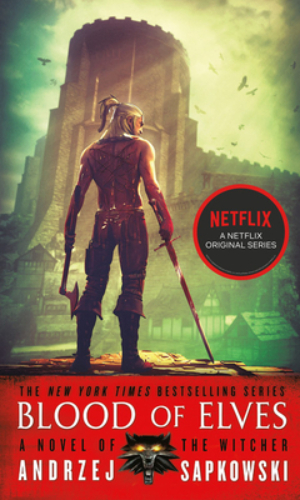
Blood of Elves, the inaugural full-length novel in Andrzej Sapkowski’s enchanting Witcher series, steps out of the shadow of its short story predecessors with the grace of a cat and the occasional stumble of a newborn fawn. This book marks the transition from the episodic escapades of Geralt of Rivia, our beloved monster-slaying hero with a heart as golden as his eyes, to a more expansive narrative.
In this installment, Sapkowski invites us to the illustrious halls of Kaer Morhen, where witchers are brewed stronger than their potions, and then sweeps us across the richly imagined Continent from the bustling streets of Oxenfurt to the enigmatic ruins of Shaerrawedd. Unfortunately, the pacing of Blood of Elves sometimes resembles a wagon navigating a cobblestone road—jarring yet determined. And yes, the ending might leave readers feeling like guests at a banquet where dessert was promised but not served.
7. Season of Storms (The Witcher Saga Book 6)
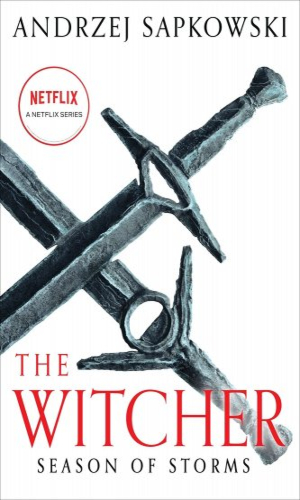
Season of Storms is a prequel that playfully gambols around the timeline. Here, we rendezvous with Geralt in his vibrant, younger years, when his silver hair had a few less battle-worn tangles. The familiar and the novel coexist in this book, which serves up a delicious medley of Witcher staples like corrupt mages, horrific encounters, and social commentary served over a bed of medieval fantasy.
Still, Season of Storms saunters along its own winding path, meandering through lengthy dialogues that sometimes stretch like a lazy cat in the sun. Sapkowski’s penchant for, shall we say, an appreciative eye towards his female characters takes a front-row seat, at times eliciting an eye-roll or two. Though it may lack the deep connective roots that intertwine the other books, Season of Storms is a nice enough detour offering a glimpse into the untold chronicles of our favorite silver-haired Witcher.
6. Baptism of Fire (The Witcher Saga Book 3)
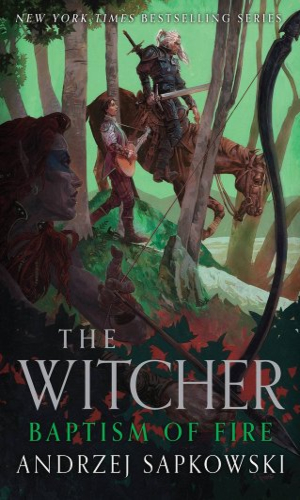
The third installment is where the plot thickens. Here, Geralt of Rivia embarks on a quest reminiscent of an epic road trip, minus the cheery sing-alongs but brimming with enough swordplay and sorcery to keep things lively. In this volume, Geralt, ever the reluctant hero, assembles a crew—a hansa, if you will— including a sharp-shooting archer, a philosopher vampire, and the ever-loquacious bard Dandelion. Together, they traverse the Continent, which is rife with political intrigue.
Sapkowski writes a story rich in character development and ideological debate. The conversations among Geralt’s crew are full of wit and wisdom, often diving into the deeper end of life’s pool. Yet, not all is smooth sailing; Baptism of Fire, like a spirited steed, occasionally bucks and rears, particularly when it shifts to Ciri’s less compelling escapades with the Rats.
5. Sword of Destiny (The Witcher Short Stories Book 2)
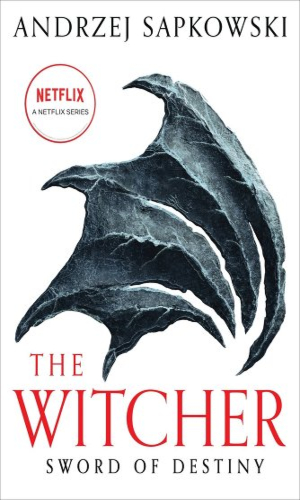
Sword of Destiny is the second scintillating string of short stories in Andrzej Sapkowski’s Witcher universe. Like a well-aged potion, this collection effectively combines the bizarre and the philosophical without letting go of its sense of humor. Here, Geralt of Rivia finds himself entangled in various twisted scenarios. Sapkowski writes tales ranging from dopplers in distress to melancholic mermaids, each story highlighting a more decadent backdrop to the Witcher’s world.
Sword of Destiny is less about slicing through beasts and more about dissecting the complexities of fate, love, and the often-blurry line between monsters and men. Here, the relationship between Geralt and Yennefer dances with the instability of a cyclone. Ciri’s destiny also entwines with that of our stoic hero in a turn of events that is as inevitable as a prophecy.
4. The Tower of Swallows (The Witcher Saga Book 4)
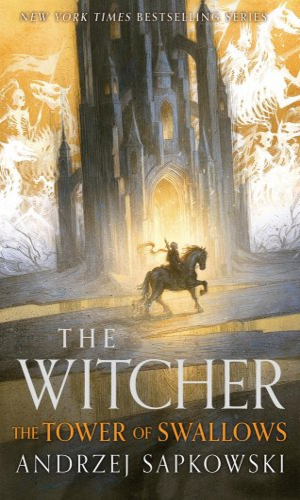
The Tower of Swallows takes a sharp turn into the darker corridors of the series, where the shadows are as deep as the lore and just as intriguing. Here, we find our protagonist, Geralt of Rivia, a knight not so much in shining armor as in weathered leather and sarcasm, continuing his search for Ciri, his protégé.
The story revolves around Ciri’s ordeal, which is both terrifying and thrilling in equal measure. Her journey, hampered by meetings with the heartless mercenary Leo Bonhart, unfolds with a storm’s intensity. Amid everything, Geralt’s quest swirls like a river, sometimes strong, other times slow, replete with close encounters and near misses that leave the reader perched on the edge of their seat.
3. The Last Wish (The Witcher Short Stories Book 1)
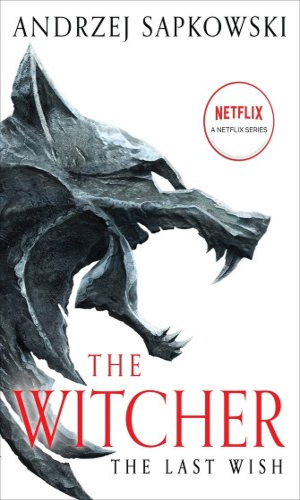
With a fusion of the magical and the satirical, Andrzej Sapkowski’s The Last Wish, his initial foray into the world of Geralt of Rivia, serves as an entrée to the magnificent banquet that is The Witcher series. This collection of short stories introduces us to our silver-haired, monster-hunting hero.
Each story carries dark humor and moral complexity, all written in Sapkowski’s inimitable style. Within these pages, we see Geralt tangling with not just creatures of the night but also the often more perplexing intricacies of human (and inhuman) nature. The tales, from a morally ambiguous altercation with a Striga to the titular “Last Wish,” showcasing a budding, tumultuous romance with the enigmatic Yennefer, are as varied as the potions in Geralt’s kit.
2. The Time of Contempt (The Witcher Saga Book 2)
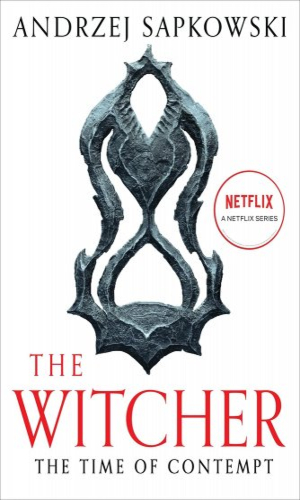
The story really starts to heat up in The Time of Contempt, where tensions rise like steam from a dragon’s nostrils. In this installment, Geralt of Rivia must face terrible creatures, sorcery, and politics, a challenge that may be even greater than taking on a basilisk without his silver blade. The Time of Contempt is the series’ culminating novel, and its characters and plots go all out for the ball by engaging in a dangerous dance of intrigue and betrayal.
Sapkowski, like a master chef of storytelling, knows just how to spice up a tale. The Isle of Thanedd coup, a centerpiece of the novel, unfurls, revealing layers of conspiracy and shifting allegiances. Amid this, we witness the young Ciri, Geralt’s ward, stepping into her power, an arc as compelling as it is full of danger. It’s a book where every character, from sorcerers to kings, plays a high-stakes game, and Geralt, the reluctant participant, finds himself at the heart of the storm.
1. The Lady of the Lake (The Witcher Saga Book 5)
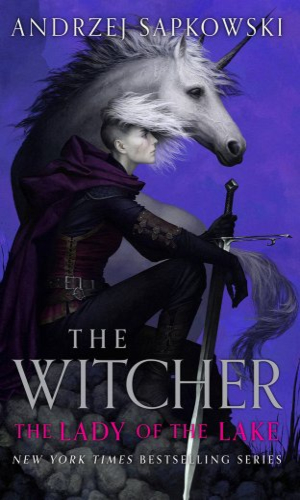
With all the magic of a climactic scene in a big play, Andrzej Sapkowski’s The Lady of the Lake shines as the crowning jewel of his Witcher saga. This installment is where the fates of Geralt, Yennefer, and Ciri culminate. Ciri’s ability to navigate space and time takes center stage, and the journey is bursting with tales, from the serene Duchy of Toussaint to the climactic face-offs that fans have eagerly awaited.
The Lady of the Lake isn’t just an ending; it’s a culmination of myth, a convergence of paths long traveled. The resolution is as satisfying as a well-timed spell, tying up loose ends with the precision of a master witcher’s blade. Yet, in true Sapkowski fashion, it leaves room for pondering.
(featured image: Netflix)



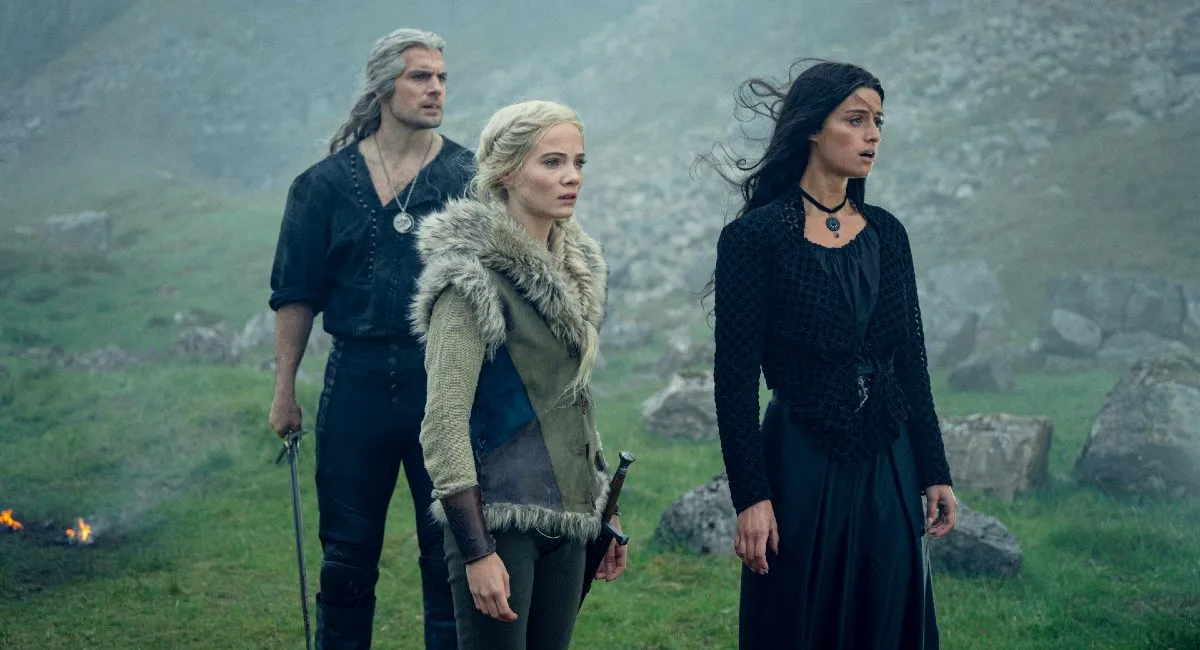






Published: Nov 17, 2023 07:29 am